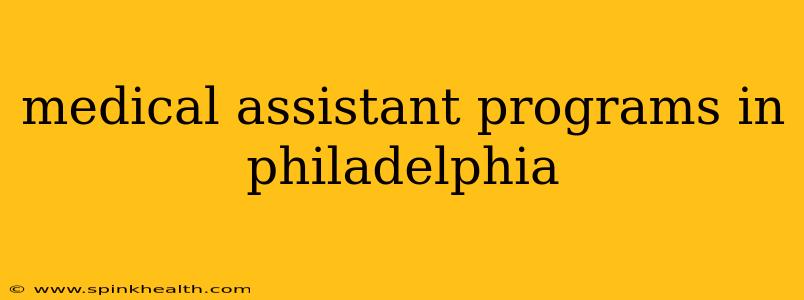Philadelphia, the City of Brotherly Love, is also a city brimming with opportunities, especially in the healthcare sector. If you're drawn to a career in medicine but aren't ready for the extensive commitment of becoming a doctor or nurse, a medical assistant (MA) program could be the perfect fit. This vibrant city boasts numerous schools offering high-quality medical assistant training, each with its own unique strengths and approach. Let's explore your options and what to consider when choosing the right program for you.
My journey into researching Philadelphia's MA programs began with a simple Google search – just like yours, likely. I was immediately struck by the sheer number of options, each promising a rewarding career. But the sheer volume of information can feel overwhelming. This guide aims to simplify that process, guiding you through the key considerations and helping you make an informed decision.
What are the Different Types of Medical Assistant Programs in Philadelphia?
This is a crucial first step. Philadelphia's schools offer a variety of formats for their medical assistant programs:
- Diploma Programs: These are typically shorter, focused programs designed to get you into the workforce quickly. They may be less comprehensive than associate's degree programs.
- Associate Degree Programs: These are longer programs, typically taking two years to complete, and offer a more in-depth education. They often provide a broader range of skills and knowledge.
- Certificate Programs: These programs focus on specific skills or aspects of medical assisting. They're ideal for those already in the healthcare field looking to add to their qualifications.
- Online Programs: While hands-on training is essential for MAs, some schools offer hybrid or online components, allowing for flexibility in learning.
The best program type for you will depend on your background, learning style, career goals, and time commitment.
What are the Accreditation and Licensing Requirements for Medical Assistants in Pennsylvania?
Pennsylvania has specific requirements for medical assistants. Accreditation is crucial; choosing a program accredited by the Commission on Accreditation of Allied Health Education Programs (CAAHEP) or the Accrediting Bureau of Health Education Schools (ABHES) ensures your education meets nationally recognized standards. This accreditation significantly increases your job prospects after graduation.
Furthermore, while Pennsylvania doesn't require state-level licensure for medical assistants, many employers prefer or require certification through organizations like the American Association of Medical Assistants (AAMA) or the National Healthcareer Association (NHA). Your chosen program will likely help you prepare for these certifications. Investigate this aspect carefully during your program research.
How Long Do Medical Assistant Programs in Philadelphia Typically Take to Complete?
Program length varies, depending on the type of program and the institution. Diploma programs may be completed in as little as a year, while associate degree programs typically take two years. Remember to factor in the time commitment alongside your other responsibilities when making your decision.
What is the Average Cost of Medical Assistant Programs in Philadelphia?
The cost of medical assistant programs varies significantly depending on the institution and program length. Tuition, fees, and books should be carefully considered, and researching financial aid options is highly recommended. Many schools offer financial aid packages, scholarships, and payment plans.
What are the Job Prospects After Completing a Medical Assistant Program in Philadelphia?
Philadelphia's robust healthcare system offers excellent job prospects for medical assistants. Hospitals, clinics, physician's offices, and other healthcare facilities are consistently seeking qualified MAs. The demand for MAs is expected to continue growing, making this a stable and rewarding career path. Networking during your program and participating in internships can further enhance your job prospects after graduation.
What are the Different Specializations within Medical Assisting?
While the core duties of a medical assistant remain consistent, some MAs choose to specialize in specific areas, such as:
- Clinical Medical Assisting: Focusing on patient care, such as taking vital signs, administering medications, and assisting with procedures.
- Administrative Medical Assisting: Concentrating on tasks like scheduling appointments, managing medical records, and handling billing and insurance.
- Pediatric Medical Assisting: Working specifically with children.
- Geriatric Medical Assisting: Working with elderly patients.
Exploring your interests and career goals will help you determine whether a specialization within the field aligns with your ambitions.
This detailed guide provides a comprehensive starting point for your search for the perfect medical assistant program in Philadelphia. Remember to thoroughly research each program, consider your individual needs and goals, and don't hesitate to reach out to the schools directly with any questions. Your future career in healthcare awaits!

